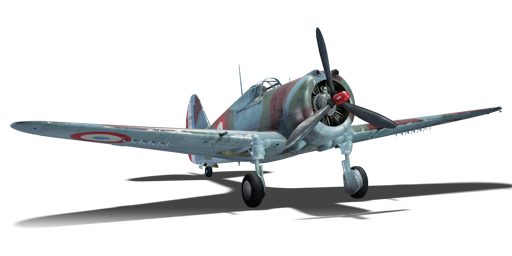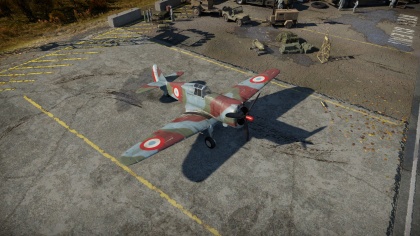Difference between revisions of "H-75A-1"
m |
Inceptor57 (talk | contribs) (Fixed up page) |
||
| Line 149: | Line 149: | ||
== Usage in the battles == | == Usage in the battles == | ||
<!--''Describe the tactics of playing in an aircraft, the features of using vehicles in a team and advice on tactics. Refrain from creating a "guide" - do not impose a single point of view but give the reader food for thought. Examine the most dangerous enemies and give recommendations on fighting them. If necessary, note the specifics of the game in different modes (AB, RB, SB).''--> | <!--''Describe the tactics of playing in an aircraft, the features of using vehicles in a team and advice on tactics. Refrain from creating a "guide" - do not impose a single point of view but give the reader food for thought. Examine the most dangerous enemies and give recommendations on fighting them. If necessary, note the specifics of the game in different modes (AB, RB, SB).''--> | ||
| − | Its quick firing streams of low-calibre bullets are not to be underestimated, especially given the agility of the plane, as it is easy to get critical bursts of bullets into vital parts of the enemy's vehicle. In general, what it can't outrun it can out-turn, which means that it will be very hard for enemies to shake it off once it gets on their tail. Do mind that | + | Its quick firing streams of low-calibre bullets are not to be underestimated, especially given the agility of the plane, as it is easy to get critical bursts of bullets into vital parts of the enemy's vehicle. In general, what it can't outrun it can out-turn, which means that it will be very hard for enemies to shake it off once it gets on their tail. Do mind that to not engage fighters head-on, as the wing-mounted, low calibre weapons aren't well suited for that sort of engagement. Exceptions include particularly vulnerable and poorly armed fighters, such as most [[:Category:Biplanes|Biplanes]]. With bombers, the story is different, engaging them head-on and firing at the cockpit is a good way to score a pilot snipe. |
| − | That it can out-turn many planes is not an excuse to engage in fancy maneuvers whenever the chance presents itself — even the best turner will tire itself out and become easy prey if it doesn't watch its speed and altitude. Be clever with who | + | That it can out-turn many planes is not an excuse to engage in fancy maneuvers whenever the chance presents itself — even the best turner will tire itself out and become easy prey if it doesn't watch its speed and altitude. Be clever with who to engage — if faced with two well turning fighters like the [[CR.42]] and one fast fighter like the [[He 100 D-1]], engage the faster one first so that the {{PAGENAME}} don't end up sandwiched between an aircraft that can out-turn it and an aircraft that can outrun it. This is of course not a rule set in stone, but these are the decisions that should be consciously assessed before engaging. If thinking through these decisions rationally and with a cool-head (who to engage, climbing, diving, or going in a straight line, etc.) a pilot could see the great potential of this aircraft. |
===Manual Engine Control=== | ===Manual Engine Control=== | ||
Revision as of 01:39, 12 January 2019
Contents
| This page is about the aircraft H-75A-1. For other uses, see P-36 (Disambiguation) |
Description
The H-75A-1 is a Rank I French fighter
with a battle rating of 1.3 (AB) and 1.7 (RB/SB).. It was introduced in Update 1.75 "La Résistance".
The H-75 is an all-round very effective fighter in War Thunder. It has an excellent turn rate and its top speed of 560 km/h at low altitude is very impressive, as it can outrun most of its competitors. Its fiercest opponent is the Bf 109, against which it loses most notably in the climbing department. To survive against these in realistic battles and simulator battles, it is important not to use WEP outside of combat, as whereas WEP itself is infinite, the plane's cooling capacity is not – attentive pilots will notice that it decreases with time if they push WEP too hard — at the beginning of a fly out, the H-75 A-1's engine will only show signs of overheating at 235ºC(455ºF), whereas after pushing WEP too hard, the engine will begin to struggle at 225ºC. Engine management is as such one of the crucial skills for mastering this plane. With the engine weakened from overheating, a player will find it hard to beat a Bf 109 if in an energy disadvantage. With a healthier engine, the pilot can keep the engine roaring at full power so as to endure sustained maneuvering without eventually stalling and dropping like a rotten apple from a tree.
General info
Flight Performance
| Characteristics | |||||||
|---|---|---|---|---|---|---|---|
| Stock | |||||||
| Max Speed (km/h at ?,000 m) |
Max altitude (meters) |
Turn time (seconds) |
Rate of climb (meters/second) |
Take-off run (meters) | |||
| AB | RB | AB | RB | AB | RB | ||
| ? | ? | ?,000 | ??.? | ??.? | ??.? | ??.? | ??? |
| Upgraded | |||||||
| Max Speed (km/h at ?,000 m) |
Max altitude (meters) | Turn time (seconds) | Rate of climb (meters/second) |
Take-off run (meters) | |||
| AB | RB | AB | RB | AB | RB | ||
| ? | ? | ?,000 | ??.? | ??.? | ?.? | ?.? | ? |
Details
| Features | ||||
|---|---|---|---|---|
| Combat flap | Take-off flap | Landing flap | Air brakes | Arrestor gear |
| X | X | X | X | X |
| Limits | ||||
|---|---|---|---|---|
| Wing-break speed (km/h) |
Gear limit (km/h) |
Combat flap (km/h) |
Max Static G | |
| + | - | |||
| ??? | ??? | ??? | ~?? | ~? |
| Optimal velocities | |||
|---|---|---|---|
| Ailerons (km/h) |
Rudder (km/h) |
Elevators (km/h) |
Radiator (km/h) |
| < ??? | < ??? | < ??? | > ??? |
| Compressor (RB/SB) | ||
|---|---|---|
| Setting 1 | ||
| Optimal altitude | 100% Engine power | WEP Engine power |
| ?,??? m | ??? hp | ?,??? hp |
Survivability and armour
- 9.5 mm steel plate behind the pilot.
Armaments
Offensive armament
The H-75A-1 is armed with:
- 2 x 7.5 mm Mle 38 machine guns (600 rpg = 1,200 total)
- 2 x 7.5 mm Mle 38 machine guns (500 rpg = 1,000 total)
The four machine guns are arranged with two wing-mounted and the other two mounted in the nose of the aircraft. The wing mounted and nose mounted guns have differing amounts of ammunitions, which means that the nose guns will continue to fire after the wing mounted guns become empty.
Usage in the battles
Its quick firing streams of low-calibre bullets are not to be underestimated, especially given the agility of the plane, as it is easy to get critical bursts of bullets into vital parts of the enemy's vehicle. In general, what it can't outrun it can out-turn, which means that it will be very hard for enemies to shake it off once it gets on their tail. Do mind that to not engage fighters head-on, as the wing-mounted, low calibre weapons aren't well suited for that sort of engagement. Exceptions include particularly vulnerable and poorly armed fighters, such as most Biplanes. With bombers, the story is different, engaging them head-on and firing at the cockpit is a good way to score a pilot snipe.
That it can out-turn many planes is not an excuse to engage in fancy maneuvers whenever the chance presents itself — even the best turner will tire itself out and become easy prey if it doesn't watch its speed and altitude. Be clever with who to engage — if faced with two well turning fighters like the CR.42 and one fast fighter like the He 100 D-1, engage the faster one first so that the H-75A-1 don't end up sandwiched between an aircraft that can out-turn it and an aircraft that can outrun it. This is of course not a rule set in stone, but these are the decisions that should be consciously assessed before engaging. If thinking through these decisions rationally and with a cool-head (who to engage, climbing, diving, or going in a straight line, etc.) a pilot could see the great potential of this aircraft.
Manual Engine Control
| MEC elements | ||||||
|---|---|---|---|---|---|---|
| Mixer | Pitch | Radiator | Supercharger | Turbocharger | ||
| Oil | Water | Type | ||||
| Not controllable | Controllable Automatic pitch |
Controllable | Not controllable | Combined | Controllable | Not controllable |
Modules
| Tier | Flight performance | Survivability | Weaponry |
|---|---|---|---|
| I | |||
| II | |||
| III | |||
| IV |
Pros and cons
Pros:
- Great armament for its rank
- Good maneuverability for a monoplane
- Very fast for its BR
Cons:
- Hard to control at high speeds
- Engine is rather fragile
- Will face biplanes which nullify its good maneuverability
History
Describe the history of the creation and combat usage of the aircraft in more detail than in the introduction. If the historical reference turns out to be too big, take it to a separate article, taking a link to an article about the vehicle and adding a block "/ historical reference" (example: https://wiki.warthunder.com/Name-vehicles/historical reference) and add a link to it here using the main template. Be sure to include links to sources at the end of the article.
Media
An excellent addition to the article will be video guides, as well as screenshots from the game and photos.
Read also
Links to the articles on the War Thunder Wiki that you think will be useful for the reader, for example,
- reference to the series of the aircraft;
- links to approximate analogues of other nations and research trees.
Sources
Paste links to sources and external resources, such as:
- topic on the official game forum;
- page on aircraft encyclopedia;
- other literature.
| France fighters | |
|---|---|
| Dewoitine | D.371 · D.371 H.S.9 · D.373 · D.500 · D.501 · Pallier's D.510 · D.520 |
| Morane-Saulnier | M.S.405C1 · M.S.406C1 · M.S.410 |
| Arsenal | V.G.33C-1 |
| Bloch | M.B.152C1 · M.B.157 |
| Caudron | C.R.714 |
| Sud-Ouest | S.O.8000 Narval |
| American | H-75A-1 · H-75A-4 · ▄P-39Q-25 · ▄P-40F-5 Lafayette · ▄P-47D-22-RE · ▄P-63C-5 · F-6C-10-NA |
| ▄F6F-5 · ▄F6F-5N · F4U-7 · ▄F8F-1B | |
| Other countries | ▄Seafire LF Mk.III · ▄Yak-3 · Challe's ▄Yak-9T · NC.900 |
| Belgium | ▄Gladiator Mk I · ▄Spitfire FR Mk XIVe |
| Netherlands | ◘Sea Fury FB 51 |





